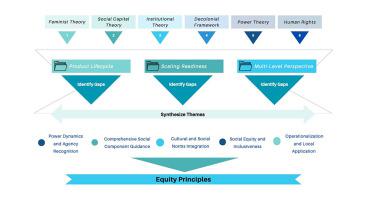当前位置:
X-MOL 学术
›
Agric. Syst.
›
论文详情
Our official English website, www.x-mol.net, welcomes your feedback! (Note: you will need to create a separate account there.)
Equity principles: Using social theory for more effective social transformation in agricultural research for development
Agricultural Systems ( IF 6.1 ) Pub Date : 2024-05-22 , DOI: 10.1016/j.agsy.2024.103999 Erin McGuire , Maha Al-Zu'bi , Maria Boa-Alvarado , Thi Thu Giang Luu , Janelle M. Sylvester , Eva Marina Valencia Leñero
Agricultural Systems ( IF 6.1 ) Pub Date : 2024-05-22 , DOI: 10.1016/j.agsy.2024.103999 Erin McGuire , Maha Al-Zu'bi , Maria Boa-Alvarado , Thi Thu Giang Luu , Janelle M. Sylvester , Eva Marina Valencia Leñero

|
Agricultural innovations and their applications are increasingly recognized as crucial mechanisms for achieving the 2030 Sustainable Development Goals (SDGs). Actors in agricultural research for development (AR4D) frequently use Agricultural Innovation Systems (AIS) frameworks to comprehend the ecosystems within which innovations are developed and scaled. Given the SDGs' emphasis on social outcomes, a reflection on social diversity, power, and the integration of social theory into AIS and AR4D tools is crucial for addressing the nuances of social objectives. This research critically evaluates AIS frameworks and AR4D tools through applying social theory to enhance social outcomes. We offer practical application through the development of “Equity Principles for Social Transformation (EPs).” These EPs are designed to guide AR4D organizations in innovation and scaling efforts that effectively achieve meaningful social outcomes. Through this approach, we aim to enrich the conceptual understanding of equity within AIS and provide practical strategies for implementing these insights, thus empowering AR4D actors to be more effective. We start by selecting key social theories to analyze global power imbalances and local social exclusion within AIS frameworks and AR4D tools. Using these theories, we examine three case studies to uncover gaps in their approach to social dimensions. We categorize these gaps through thematic analysis and formulate EPs informed by social theories and a practical understanding of AR4D tools. Equity analysis of each case study reveals gaps in understanding social implications within upstream and downstream research efforts. These gaps include insufficient addressing of power dynamics and agency recognition, lack of comprehensive guidance on critical social components, oversight of cultural and institutional norms, exacerbation of social inequities, and the case studies' limitations in flexibility for addressing social inclusion effectively. Additionally, there is a notable lack of clear operational guidelines for applying the frameworks in diverse contexts, including the challenge of translating conceptual levels into local action. Seven EPs were developed: recognize AR4D power dynamics; define goals, anti-goals, and for whom; build global “horizontal” partnerships; acknowledge social differences among innovation users and non-users; innovate and curate innovation appropriately; assess impact and reflect; and develop systems capacity. The EPs connect innovation systems with positive social change. They help AR4D professionals consider and evaluate the impact of innovation. The EPs provide an additional framework that enables AR4D practitioners to prioritize user needs from the beginning, challenge biases, and more effectively achieve the social objectives outlined in the SDGs.
中文翻译:

公平原则:利用社会理论在农业研究促进发展中实现更有效的社会转型
农业创新及其应用越来越被认为是实现 2030 年可持续发展目标 (SDG) 的关键机制。农业研究促进发展 (AR4D) 的参与者经常使用农业创新系统 (AIS) 框架来理解创新开发和规模化的生态系统。鉴于可持续发展目标强调社会成果,反思社会多样性、权力以及将社会理论融入 AIS 和 AR4D 工具对于解决社会目标的细微差别至关重要。这项研究通过应用社会理论来增强社会成果,批判性地评估了 AIS 框架和 AR4D 工具。我们通过制定“社会转型的公平原则(EP)”来提供实际应用。这些 EP 旨在指导 AR4D 组织进行创新和扩展工作,以有效实现有意义的社会成果。通过这种方法,我们的目标是丰富 AIS 内公平的概念理解,并提供实施这些见解的实用策略,从而使 AR4D 参与者更加有效。我们首先选择关键的社会理论来分析 AIS 框架和 AR4D 工具内的全球权力失衡和当地社会排斥。利用这些理论,我们研究了三个案例研究,以揭示他们在社会维度方法上的差距。我们通过主题分析对这些差距进行分类,并根据社会理论和对 AR4D 工具的实际理解制定 EP。对每个案例研究的公平分析揭示了上游和下游研究工作中在理解社会影响方面的差距。 这些差距包括对权力动态和机构认可的解决不足、缺乏对关键社会组成部分的全面指导、对文化和制度规范的监督、社会不平等的加剧以及案例研究在有效解决社会包容问题方面的灵活性的限制。此外,还明显缺乏在不同背景下应用框架的明确操作指南,包括将概念层面转化为当地行动的挑战。开发了七个 EP:认识 AR4D 动力动态;定义目标、反目标以及为谁服务;建立全球“横向”伙伴关系;承认创新用户和非用户之间的社会差异;适当地创新和策划创新;评估影响并反映;并发展系统能力。 EP 将创新系统与积极的社会变革联系起来。它们帮助 AR4D 专业人士考虑和评估创新的影响。 EP 提供了一个额外的框架,使 AR4D 从业者能够从一开始就优先考虑用户需求,挑战偏见,并更有效地实现 SDG 中概述的社会目标。
更新日期:2024-05-22
中文翻译:

公平原则:利用社会理论在农业研究促进发展中实现更有效的社会转型
农业创新及其应用越来越被认为是实现 2030 年可持续发展目标 (SDG) 的关键机制。农业研究促进发展 (AR4D) 的参与者经常使用农业创新系统 (AIS) 框架来理解创新开发和规模化的生态系统。鉴于可持续发展目标强调社会成果,反思社会多样性、权力以及将社会理论融入 AIS 和 AR4D 工具对于解决社会目标的细微差别至关重要。这项研究通过应用社会理论来增强社会成果,批判性地评估了 AIS 框架和 AR4D 工具。我们通过制定“社会转型的公平原则(EP)”来提供实际应用。这些 EP 旨在指导 AR4D 组织进行创新和扩展工作,以有效实现有意义的社会成果。通过这种方法,我们的目标是丰富 AIS 内公平的概念理解,并提供实施这些见解的实用策略,从而使 AR4D 参与者更加有效。我们首先选择关键的社会理论来分析 AIS 框架和 AR4D 工具内的全球权力失衡和当地社会排斥。利用这些理论,我们研究了三个案例研究,以揭示他们在社会维度方法上的差距。我们通过主题分析对这些差距进行分类,并根据社会理论和对 AR4D 工具的实际理解制定 EP。对每个案例研究的公平分析揭示了上游和下游研究工作中在理解社会影响方面的差距。 这些差距包括对权力动态和机构认可的解决不足、缺乏对关键社会组成部分的全面指导、对文化和制度规范的监督、社会不平等的加剧以及案例研究在有效解决社会包容问题方面的灵活性的限制。此外,还明显缺乏在不同背景下应用框架的明确操作指南,包括将概念层面转化为当地行动的挑战。开发了七个 EP:认识 AR4D 动力动态;定义目标、反目标以及为谁服务;建立全球“横向”伙伴关系;承认创新用户和非用户之间的社会差异;适当地创新和策划创新;评估影响并反映;并发展系统能力。 EP 将创新系统与积极的社会变革联系起来。它们帮助 AR4D 专业人士考虑和评估创新的影响。 EP 提供了一个额外的框架,使 AR4D 从业者能够从一开始就优先考虑用户需求,挑战偏见,并更有效地实现 SDG 中概述的社会目标。
















































 京公网安备 11010802027423号
京公网安备 11010802027423号